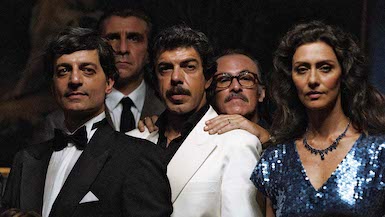The 400-Word Review: The Traitor
By Sean Collier
April 2, 2020
BoxOfficeProphets.com

“The Traitor,” an alternatingly boisterous and reflective drama by Marco Bellocchio, was Italy’s submission to this year’s ceremony. (Countries choose which film they will present to the Academy for consideration; the nominees are selected, in typical Academy secrecy, from those submissions.) It was not nominated; it wouldn’t have won in the face of “Parasite” and obvious runner-up “Pain and Glory.” (Italy’s on a slow streak; only one of those 11 winners, “The Great Beauty,” is from the 21st century.)
Yet I wish it would’ve made the list; it would’ve been fascinating to see a direct counterpart to “The Irishman” among this year’s nominees.
Like Scorsese’s film, “The Traitor” is an organized-crime tale told from the perspective of a survivor. And, like “The Irishman,” it’s a biography — as true a tale as any mafia narrative is likely to be.
Tommaso Buscetta (Pierfrancesco Favino, excellent) doesn’t accept that a promised peace between rival factions of Cosa Nostra is to be trusted. He flees to Brazil while his former associates are gunned down in Sicily; when the wave of violence reaches two of his adult sons, he decides to testify against the gangs.
Much of Buscetta’s struggle is internal; he is in a wrestling match with his own guilt, desperate to see himself as an honorable member of the family and not an informant. It’s the rest of them that compromised the organization, he thinks. That moral bargaining doesn’t mean much to his former associates — or even the Italian public — and he soon finds himself living in the United States under witness protection.
Both “The Irishman” and “The Traitor” explore how hollow the back half of a criminal life can be. Even as Buscetta continues to fight for justice for his children and friends, the struggle seems hollow; whether he’s in the courtroom or singing a ballad at his own birthday party, it seems his spirit has long since departed.
“The Traitor” is probably a step behind the epic impact of its Stateside counterpart, but the two films would make a fascinating (if dauntingly long) double-feature. Maybe Marty’s movie didn’t close the book on mob narratives after all.
My Rating: 8/10
“The Traitor” is available as a virtual cinema selection at many independent theaters during the COVID-19 pandemic. Watch it from home via Row House Online or many other independent cinemas; a portion of your ticket purchase will go to keep theaters afloat during the pandemic.